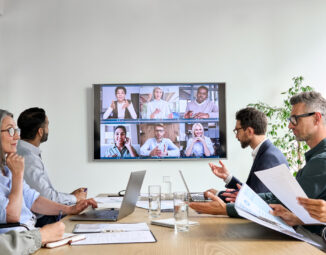Game Changer: NLRB Rules College Football Players Can Unionize
In a stunning decision released March 26, 2014, the Regional Director of the Chicago Region of the National Labor Relations Board (NLRB), Peter Sung Ohr, ruled that Northwestern University scholarship football players are entitled to have a union election because they are “employees” of the school under Section 2(3) of the National Labor Relations Act (NLRA). Specifically, in Northwestern University v. College Athletes Players Association (CAPA), Case 13-RC-121359, the NLRB held that the football players primarily have an economic relationship with the university, which controls and directs their daily activities and compensates them in the form of scholarships. Although this decision will likely be appealed, it has the potential to alter dramatically the world of college sports. Read on for a play-by-play of the NLRB’s game-changing decision.
Standoff at the Line of Scrimmage
Northwestern’s football team is comprised of about 112 players of which there are 85 players who receive football grant-in-aid scholarships that pay for their tuition, fees, room, board, and books (totaling approximately $61,000 each academic year). Northwestern reported to the Department of Education that its football team generated total revenues of $235 million and incurred total expenses of $159 million between 2003 and 2012. For the 2012-2013 academic year, Northwestern reported that its football program generated $30.1 million in revenue and $21.7 million in expenses.
In its petition to the NLRB, CAPA claimed that the football players receiving grant-in-aid scholarships (“the players”) from Northwestern are “employees” within the meaning of the NLRA, and therefore are entitled to choose whether or not to be represented for purposes of collective-bargaining. To the contrary, Northwestern asserted that the players are not “employees;” rather, the overall relationship between the players and the university is primarily an educational one, rather than an economic one. In support of its argument, Northwestern cited to the Board’s decision in Brown University, 342 NLRB 483 (2004), wherein the Board held that the petitioning graduate assistants were not “employees” under the NLRA because their relationship with the university was primarily an educational one. In the alternative, Northwestern asserted that the players are temporary employees who are not eligible for collective bargaining.
Game Time
The NLRB held that the players are employees because they are receiving scholarships as compensation to perform football-related services for Northwestern and their daily activities are subject to Northwestern’s control. The NLRB held that the statutory test applied in Brown University, 342 NLRB 483 (2004), was inapplicable to the instant case because “the players’ football-related duties are unrelated to their academic studies unlike the graduate assistants whose teaching and research duties were inextricably related to their graduate degree requirements.” Finally, the NLRB held that the players are not temporary employees, because the players have a finite duration of employment pursuant to NCAA eligibility rules, which state that the players may generally only remain on the football team for four years (or at most five years in the case of a “redshirt” player). In support of its decision, the NLRB made the following findings:
- Grant-in-aid scholarship football players perform services for the benefit of Northwestern for which they receive compensation
The NLRB held that although “the players do not receive a paycheck in the traditional sense, they nevertheless receive a substantial economic benefit for playing football.” The NLRB cited to Northwestern’s revenues of approximately $235 million during the nine year period 2003 – 2012 through its participation in the NCAA Division I and Big Ten Conference that were generated through ticket sales, television contracts, merchandise sales and licensing agreements. The NLRB also found that the “tender” each player is required to sign when they are offered the scholarship equates to an employment contract because it gives the players detailed information concerning the duration and conditions under which the compensation will be provided to them. The NLRB found compelling the fact that the players are truly dependent on their scholarships to pay for basic necessities, including food and shelter because NCAA rules do not permit the players to receive any additional compensation or otherwise profit from their athletic ability.
- Grant-in-aid scholarship football players are subject to Northwestern’s control in the performance of their duties as football players
The NLRB found that the players who receive scholarships are under strict and exacting control by Northwestern throughout the entire year. The NLRB explained that “commencing with training camp which begins approximately six weeks before the start of the academic year, the coaches exercise a great deal of control over the players. . . the players spend 50 to 60 hours per week engaging in football-related activities during training camp . . . the location, duration, and manner in which the players carry out their football duties are all within the control of the football coaches.” Further, the NLRB cited the fact that the football coaches are able to maintain control over the players by monitoring their adherence to NCAA and team rules and disciplining them for any violations that occur. Specifically, the decision noted:
the coaches have control over nearly every aspect of the players’ private lives by virtue of the fact that there are many rules that they must follow under threat of discipline and/or the loss of a scholarship. The players have restrictions placed on them and/or have to obtain permission from the coaches before they can: (1) make their living arrangements; (2) apply for outside employment; (3) drive personal vehicles; (4) travel off campus; (5) post items on the Internet; (6) speak to the media; (7) use alcohol and drugs; and (8) engage in gambling. The fact that some of these rules are put in place to protect the players and [Northwestern] from running afoul of NCAA rules does not detract from the amount of control the coaches exert over the players’ daily lives.
- Walk-ons are not employees under the NLRA
Despite its holding pertaining to the scholarship players, the NLRB was careful to distinguish that walk-ons do not meet the definition of “employee” for the fundamental reason that they do not receive compensation for the athletic services that they perform. The NLRB stated that “[u]nlike the scholarship players, the walk-ons do not sign a ‘tender’ or otherwise enter into any type of employment contract with [Northwestern].” Further, the NLRB explained that the walk-ons are permitted a greater amount of flexibility by the football coaches when it comes to missing portions of practices and workouts during the football season if they conflict with their class schedule. The NLRB made clear, however, that if a walk-on were to be awarded a scholarship at some later point, they would then be an “employee” within the meaning of the NLRA.
The End Zone
The NLRB ordered that an election be conducted and defined the scope of the bargaining unit as follows:
Eligible to vote are all football players receiving football grant-in-aid scholarship and not having exhausted their playing eligibility employed by the Employer located at 1501 Central Street, Evanston, Illinois, but excluding office clerical employees and guards, professional employees and supervisors as defined in the Act.
While this ruling is only applicable to Northwestern’s football program, it may open the door to union election petitions by other college athletes in similarly structured programs at private universities. If the ruling stands, private universities should prepare for union elections or consider restructuring their programs to protect their blindside.





